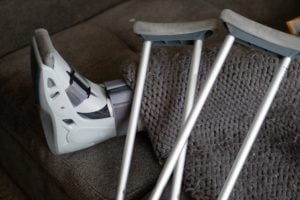What are the RIDDOR Regulations?
RIDDOR stands for the Reporting of Injuries, Diseases and Dangerous Occurrences Regulations and its latest update was in 2013.
It’s put in place to regulate the legal responsibility to report deaths, injuries, diseases and dangerous occurrences that occur at work or in connection with work.
This law requires employers to report and keep records of work-related accidents and employers or people in charge of the work premises are responsible for submitting reports under RIDDOR.
Why is it important?
The RIDDOR Regulations are important as it’s been put in place to keep employees safe at work and it holds employers responsible for negligence or bad working behaviours.
Having this law actually helps to prevent accidents since it encourages people to follow health and safety procedures and reporting an incident can help the manager to identify a potential problem area that needs to be fixed immediately.

What’s a reportable incident?
Incidents only need to be reported if the accident is work related and results in a serious injury. All deaths to workers and non-workers must be reported if it’s from work related accidents unless it’s due to suicide. Listed below are incidents deemed reportable.
Reportable injuries according to the 2013 regulations include:
- Fractures
- Amputations
- Injuries that could lead to permanent loss of sight
- Any crush injury to head or torso that causes damage to brain or internal organs
- Serious burns and scalding that covers more than 10% of the body or causes damage to eyes or respiratory system or internal organs
- Scalping requiring hospital treatment
- Any loss of consciousness due to head injury or asphyxia
- Any injury from enclosed space

Diagnoses of certain occupational diseases where they are likely to have been caused or made worse by their work need to be reported as well. These can include:
- Carpel tunnel syndrome
- Severe cramp of hand or forearm
- Occupational dermatitis
- Hand arm vibration syndrome
- Occupational asthma
- Tendonitis or tenosynovitis of hand or forearm
- Any occupational cancer
- Any disease attributed to an occupational exposure to a biological agent
It’s also important to report dangerous occurrences, including near miss incidents.
Specified near miss incident include incidents involving, lifting equipment, pressure systems, overhead electric lines, electrical incidents causing explosion or fire, explosions, biological agents, radiation generators and radiography, breathing apparatus, diving operations, collapse of scaffolding, train collisions, wells and pipelines or pipeline works.
Gas Incidents are also reportable and distributors, fillers, importers & suppliers of flammable gas must report incidents when someone has died, lost consciousness, or been taken to hospital for treatment to an injury connected to gas.
These incidents could be:
- An accidental leakage of gas
- Incomplete combustion of gas
- Inadequate removal of products of the combustion of gas

How to submit a report
Incidents must be reported within a 10 day time frame of the incident occurring and RIDDOR records must be kept for a minimum of 3 years after the date of the last incident. However, it’s advised that they’re kept for 6 years.
To report an incident, you need to go online to the website www.hse.gov.uk/riddor and complete a form.
This will then go directly to RIDDOR database and you’ll receive a copy for your work place records.
Report must include:
- The date of the recording
- Their personal details (name, job title, phone number)
- The details of their company (name, address, email)
- The location, date and time of the incident
- The personal details of the person involved (name, job title)
- A description of the injury, illness or incident







